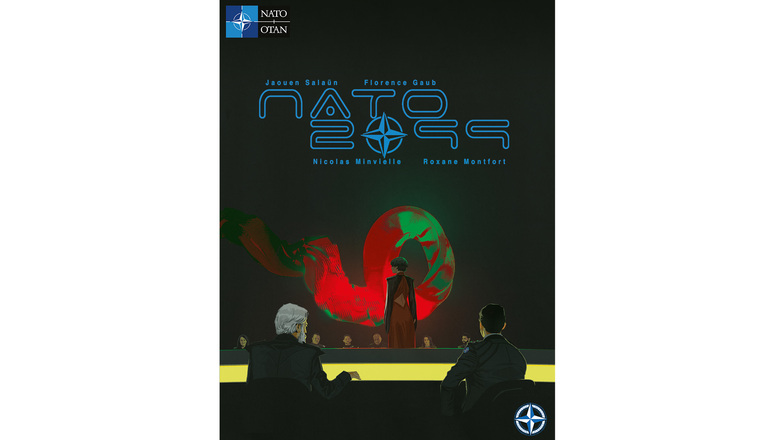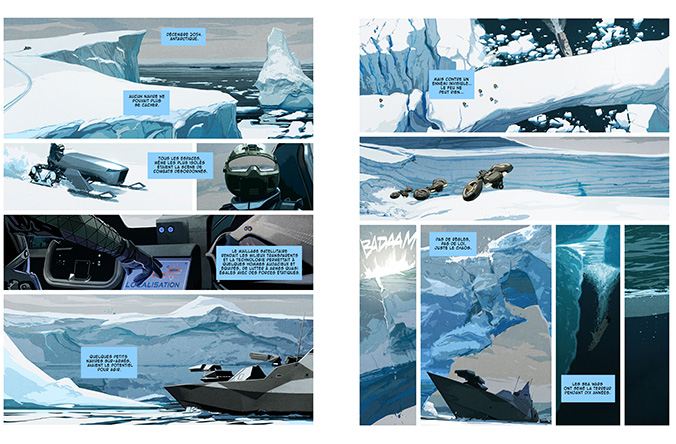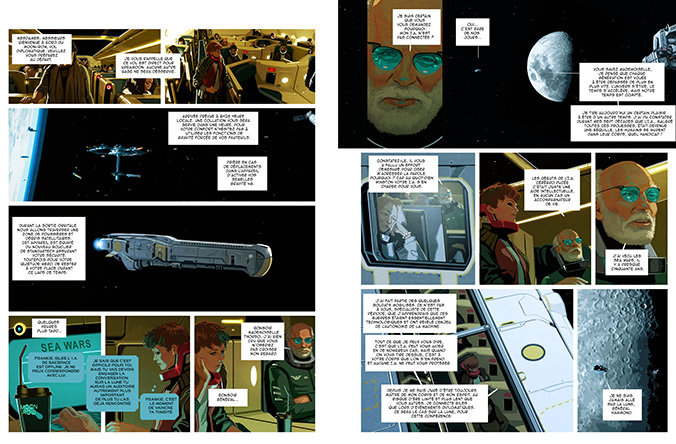In 2024, NATO is celebrating its 75th anniversary. At this key milestone, the NATO Defense College (NDC) is looking ahead to 75 years in the future, imagining what NATO - and the world - will look like in 2099.

The NATO 2099 graphic novel takes place in a world that experienced a devastating series of global maritime attacks throughout the 2050s. During these 'Sea Wars', small groups of malicious actors used unmanned technologies to blow up the warships of national navies, hold cruise ships hostage for ransom, and commit terrorist acts against civilians. After working together to defeat the networks of terrorist groups and private militias, the governments of the world signed a treaty that has kept the peace for almost 40 years. But now, in 2099, a new threat emerges in space…
Putting the story together
In October 2023, the NATO Defense College put out a call for authors from all NATO member countries to submit stories imagining the future of NATO in 2099 - 75 years from the 75th anniversary in 2024.
By early 2024, the NDC had received stories from science fiction authors representing all NATO Allies and some partner countries. After reading through all the stories, four common themes were clear: NATO in space, the effects of climate change on security and defence, the use of artificial intelligence (AI) in the military domain, and a female NATO Secretary General.
Over the following months, three lead authors from the NDC's editorial team wove together these four main threads, merging the stories of 34 authors to create a single fictional narrative. The authors then worked with artist Jaouen Salaün, assisted by Nicolas Minvielle and Roxane Montfort,to create the finished product, which includes hundreds of panels illustrating the story.
They also decided to release a selection of the standalone stories as a teaser of the full novel. On 4 April 2024, to celebrate NATO's 75th anniversary, the NDC published NATO 2099 - The science fiction anthology. Its 15 stories depict a wide range of imaginative elements (which represent the views of the authors, and not NATO or the NDC). This includes:
- telepathic weaponry
- a floating ocean city built on the wealth of harvesting pure water from icebergs
- a rogue AI that was originally created to preserve the consciousness of China's leader
- the enlargement of NATO to include Japan, Australia and other countries in the Indo-Pacific
- an AI nation state, unbound by territory, also joining NATO
- an AI Secretary General of NATO
- a 2099 NATO Summit in Kyiv, Ukraine
- Russia seeking an alliance with NATO after China targets eastern Siberia for its resources
- libraries becoming highly valuable military targets, since they are used to train AI
- synthetic tea, locust soufflé and other exotic foods
- an extended ode to NATO's past and future history, using a poetic rhyme scheme

A page from "NATO 2099: a graphic novel" © NATO Defense College
Using science fiction for defence planning
The NATO 2099 graphic novel has two key sources of inspiration.
The first is a collection of forward-looking essays, each contributed by a different European Union (EU) member country, which France produced during its Presidency of the Council of the EU (from 1 January to 30 June 2022).
The other source of inspiration is Red Team Défense, a programme run by France's Defence Innovation Agency since 2019. The Red Team is composed of science fiction authors and scriptwriters who work closely with scientific and military experts to imagine the threats that could directly endanger France and its interests in the future - focusing on the technological, economic, societal and environmental trends that could generate potential conflicts by 2030-2060 - so that the armed forces can prepare to meet these challenges.
Other NATO Allies have also used science fiction for security and defence planning purposes. Canada's Department of National Defence published a science fiction novel called Crisis in Zefra in 2005, imagining a Canadian peacekeeping force encountering new threats and technologies while monitoring an election in a fictional African country in 2025. The United States Army's Training and Doctrine Command (TRADOC) launched the Mad Scientist Laboratory initiative in 2016, which produced Science Fiction: Visioning the Future of Warfare 2030-2050. Germany's Projekt Cassandra, supported by the Federal Ministry of Defence from 2017 to 2019, aimed to use literature as an "early warning system to avoid being surprised" by "supposedly sudden" events, which were actually apparent in a region's literary output. Similar initiatives are also under way in other Allied countries.

A page from "NATO 2099: a graphic novel" © NATO Defense College
Tomorrow's NATO survives through resilience - just like today's
Future-casting can be extremely dystopian, particularly when considering the catastrophic impacts of climate change and the use of new technologies by authoritarian regimes. The NDC editorial team was therefore surprised by the overall positive tone of the submitted stories.
The authors imagine a future where fusion technology has led to a sustainable global energy system and atmospheric carbon removal is a major economic sector. Where diplomatic solutions among former adversaries are possible, including total nuclear disarmament. Where reforestation and environmental restoration become the priority of the world's militaries, and "the armies of all countries are given a hoe before a rifle and seeds before bullets." Despite challenges on the horizon, the dominant view of NATO in 2099 is one of hope.
Of course, many of the stories include negative developments in their future histories, such as the attempted invasion of Taiwan, or the United States withdrawing from NATO (and then returning). But overall, the 2099 depicted in the anthology and the graphic novel is one where NATO has weathered these storms and grown stronger. In 2099, as in 2024, the keys to NATO's success are its resilience, its unity in the face of any crisis, and its ability to adapt to meet the world's ever-evolving challenges - whether those futures are predicted or remain unforeseen.






